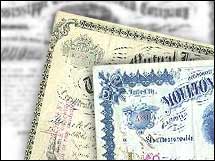The bond market's dirty secretA whiff of scandal threatens the Treasury repurchase market.(Fortune Magazine) -- Like greenbacks in a mattress, government bonds enjoy a reputation as a fail-safe investment. The integrity of the $4 trillion-plus U.S. Treasury market is essential, because it keeps investors, particularly big foreign players, pumping cash into the debt-laden federal coffers. Treasury yields are the benchmarks for corporate debt, mortgages and car loans, so any disruption in the market could have a wide-ranging economic effect.
Just such a disruption occurred on Nov. 3, when several newspapers reported that Philip Smith and Robert Fischetti were in negotiations with UBS (Charts) to leave the bank's trading desk amid rumors that the Securities and Exchange Commission was scrutinizing the bank for manipulating the Treasury repurchase, or "repo," market. The SEC declined to comment. UBS would not verify whether the pair were still at the bank, but it did say it is cooperating with a government investigation. UBS is one of the 22 investment banks that buy bonds directly from the Federal Reserve and resell them to customers, including mutual funds, pension funds, foreign investors and others. The members of this club, which include Lehman Brothers (Charts), Cantor Fitzgerald and Mizuho Securities (Charts), also use the bonds as collateral for loans. One of the privileges that come with being a primary dealer is an in-depth knowledge of who is scouring the market for a particular bond - and therein lies temptation. Sometimes a dealer with big brokerage and lending operations (let's call it Bank A) will learn that a rival (Bank B) is going to need a certain issue by a certain date. Bank A can quietly try to snap up a big portion of that issue. Then, when Bank B goes into the market trying to find those bonds, it will encounter a dearth of sellers and will be inclined to pay a premium for them. Taking big positions isn't in itself illegal, but using inside info to manipulate the market is. On Nov. 6, the 22 primary dealers were summoned to the Federal Reserve Bank of New York by the Interagency Working Group on Market Surveillance to discuss market manipulation. The Working Group includes officials from the Fed, the New York Fed, the SEC, the Commodities Futures Trading Commission and the Treasury. A week later the New York Fed announced that no bank would be allowed to hold more than 35 percent of any single issue. Old news, new concerns The Treasury market has been tarred by scandals before, most notably in 1991, when Salomon Inc. rigged five Treasury auctions. Those scams ended in the ouster of then-CEO John Gutfreund, a $290 million settlement payment, and a famous rescue of the firm by Warren Buffett. And insiders say that moneymaking shenanigans have long been a feature of the repo market. Matthew Smith, a portfolio manager at Smith Affiliated Capital, likens that world to the Wild West; some traders compare it to a casino where participants sometimes play high-risk poker with government debt. If this has been the case, why are regulators getting worked up about it now? In a speech at the Bond Market Association's meeting in May, the Treasury's undersecretary for domestic finance, Randal Quarles, said that the department had noticed an uptick in questionable trading since 2004. "I would urge any traders that establish especially large positions in any Treasury issues to tread very lightly," he warned. At the end of September the deputy assistant secretary for federal finance, James Clouse, reiterated the warning when he spoke to the Bond Market Association. During that speech, Clouse also noted that bad behavior in the repo market becomes more profitable (and thus more tempting) when short-term interest rates rise, as they have been doing lately. The Fed has raised its benchmark short-term rate to 5.25 percent from 1.0 percent in just two years. And keeping the Treasury market clean is more important than ever. As Clouse said in his speech, "If the integrity of the secondary market were to be compromised, many investors could well migrate away from Treasuries" - meaning that a blowup in the repo market could scare overseas investors away from U.S. debt in general. It's a nightmare scenario, given the fact that foreigners lend the U.S. most of the money the government uses to fund its annual deficits. Foreign banks, led by Japan and China, have been on a debt-buying spree since 2001. They now hold 55 percent of all Treasury debt, up from 35 percent in 2001. In exchange for the loans, they get the safest place in the world to put their money - or so they believe. If misdeeds discredit the market and lead foreigners to put their money elsewhere, it might take significantly higher interest rates to entice them back. ________________________ |
|


